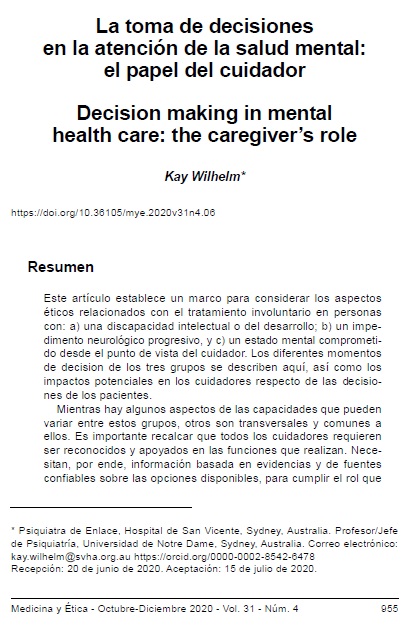Decision making in mental health care: the caregiver’s role
Main Article Content
Abstract
This paper sets a framework for considering ethical issues related to involuntary treatment in people with a) intellectual and developmental disabilities, b) progressive neurocognitive impairments, or c) compromised mental health from the caregiver’s perspective. The different time courses for three groups of conditions are described, and potential impacts on the person affected and their caregivers in relation to decision. While some issues for caregivers who are supporting capabilities of their loved ones to make healthcare decisions will vary, some principles apply across all groups. All caregivers need recognition and support for the roles they undertake. They need access to evidence-based, coherent and trustworthy information about available options, how to best fulfil these roles and how to look after their own health and wellbeing to best look after the person for whom they are caring.
Downloads
PLUMX Metrics
Article Details
Medicina y Ética is distributed under a Creative Commons License Atribución-NoComercial-CompartirIgual 4.0 Internacional.
The author keeps the property rights with no restriction whatsoever and guarantees the magazine the right to be the first publication of the work. The author is free to deposit the published version in any other medium, such as an institutional archive or on his own website.
References
2. Wyder M, Bland Robert, McCann Karen, Crompton David. La experiencia familiar de la crisis del tratamiento involuntario en salud mental. Trabajo Social Australiano. 2018; 71(3): 319-331.
3. Brasier C, Ski C, Thompson D, Cameron J, et al. El Programa de Salud Óptima de Stroke and Carer (PSOSC) para mejorar la salud psicosocial: protocolo de estudio para un ensayo controlado aleatorio. Juicios. 2016; 17(1): 446-455. https://doi.org/10.32597/dmin/512
4. Elwyn G, Frosch D, Thomson R, et al. Toma de decisiones compartida: un modelo para la práctica clínica. Revista de Medicina Interna General. 2012; 27(10): 1361-67. https://doi.org/10.1016/j.rce.2017.06.002
5. Gawande A. Ser mortal: la medicina y lo que importa al final. Nueva York: Metropolitan Books; Henry Holt & Company; 2014.
6. Ward B, Reupert A, McCormick F, Waller S, Kidd S. Práctica centrada en la familia dentro de un marco de recuperación: perspectivas cualitativas de los profesionales. BMC Health Serv Res. 2017; 17(1): 234.
7. Epstein N, Bishop D, Ryan C, Miller I, Keitner G. El Modelo de McMaster Vista del Funcionamiento Saludable de la Familia. En Walsh A. (Ed.). Nueva York y Londres: Guilford Press. Procesos familiares Normales. 1993; 138-160).
8. Organización Mundial de la Salud. Apoyo a la demencia. Manual de capacitación y apoyo para cuidadores de personas con demencia. https://www.who.int/mental_health/neurology/dementia/isupport_manual/en/ https://doi.org/10.17345/9788484247661

